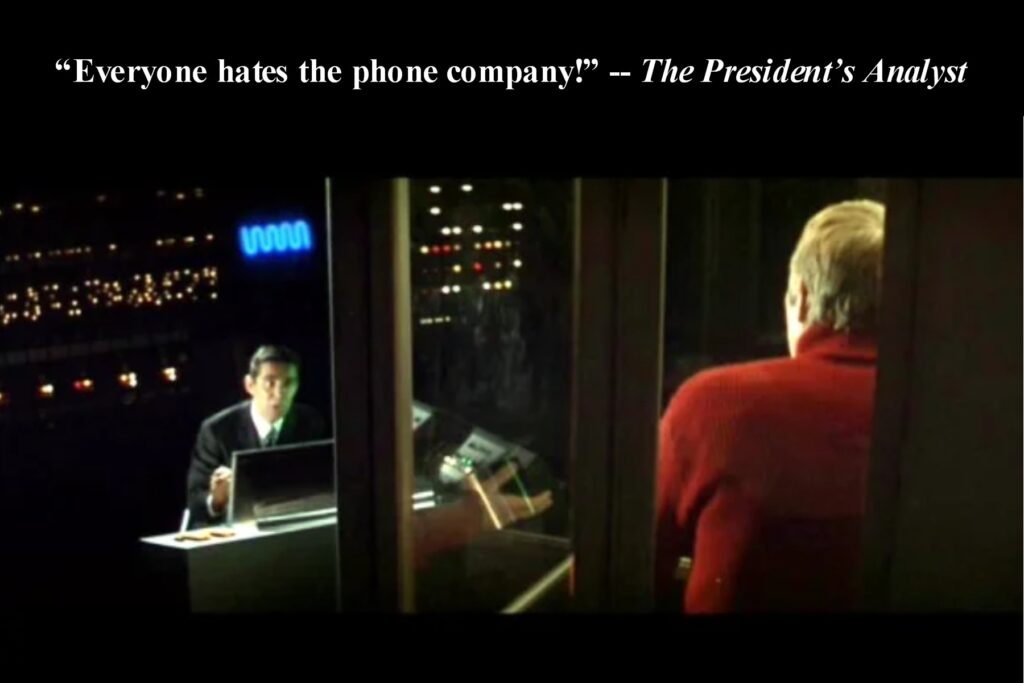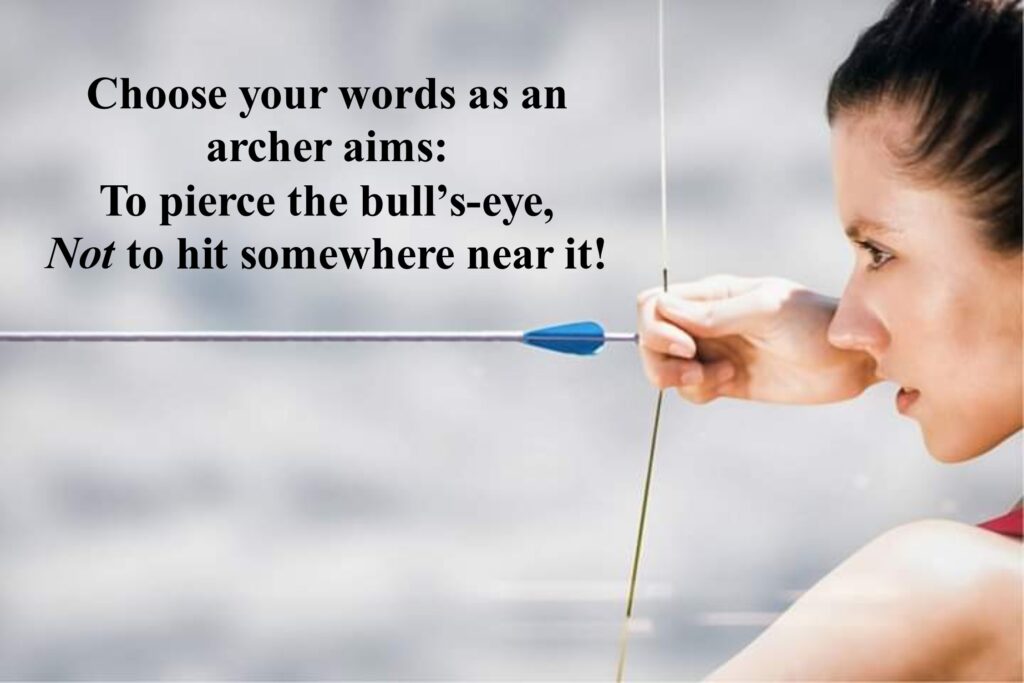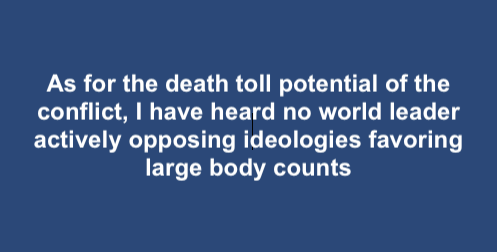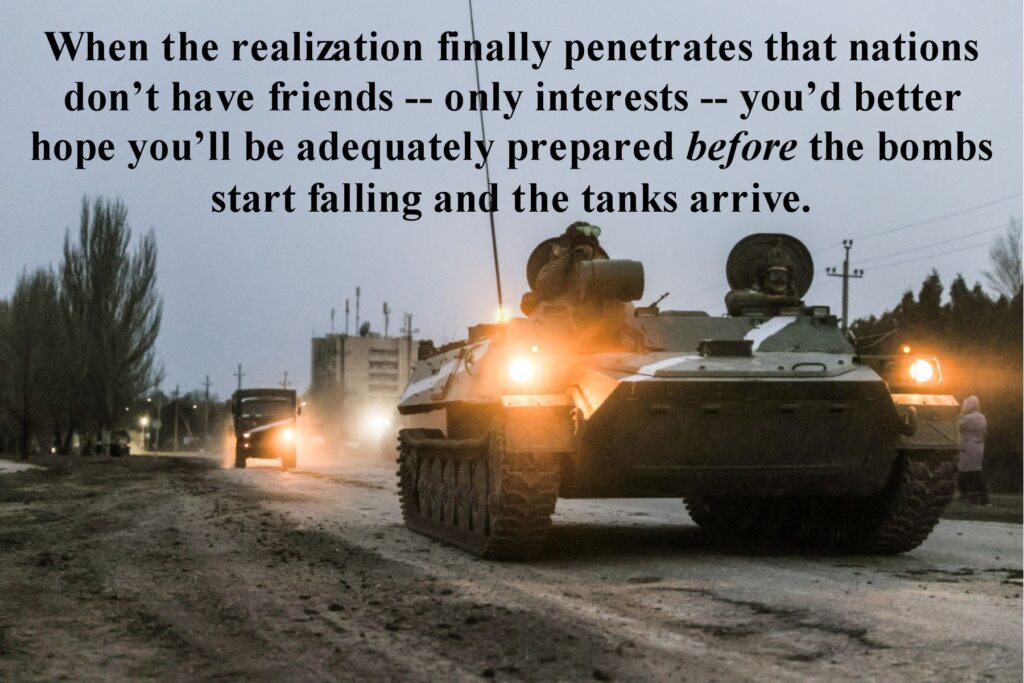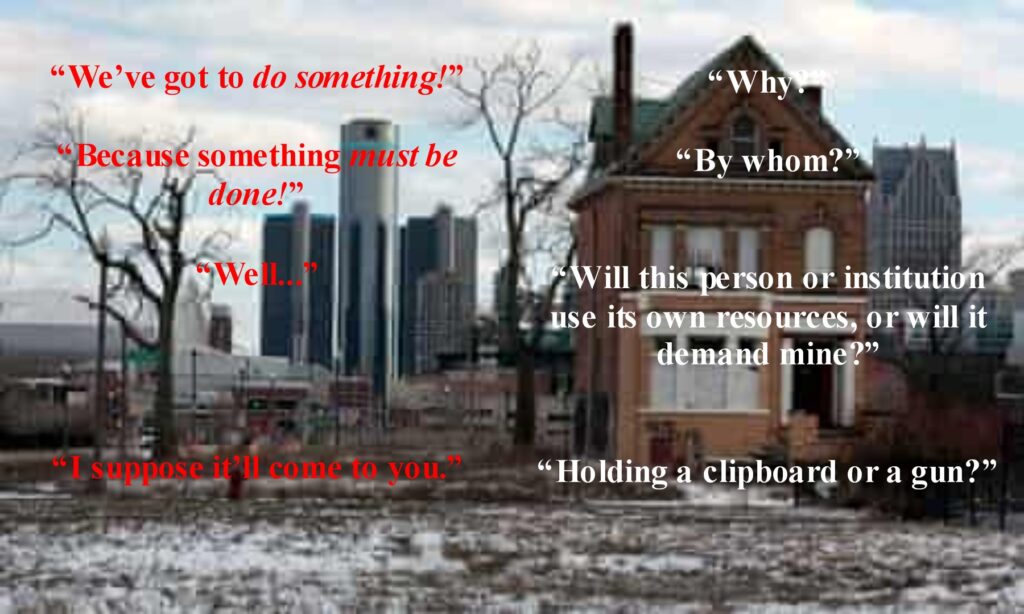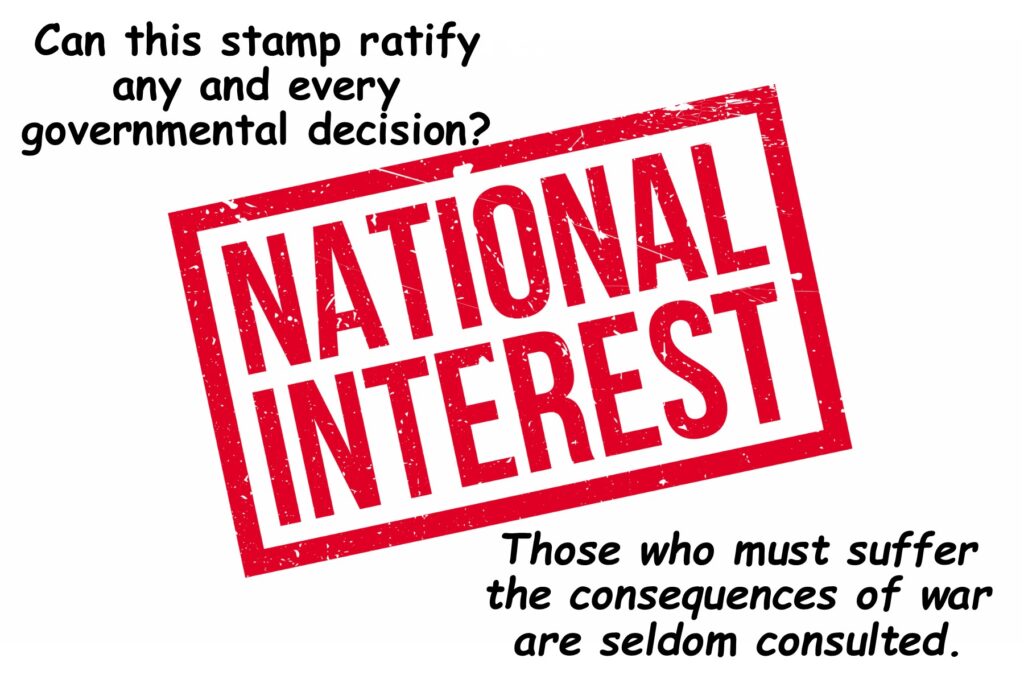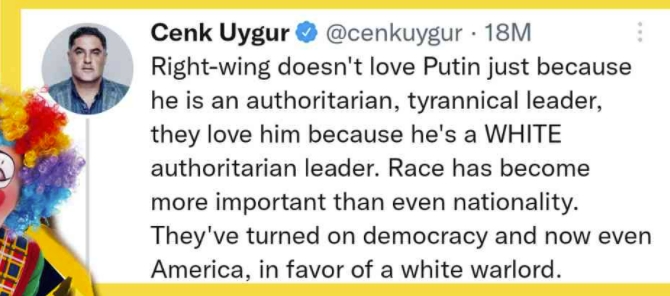
As has been happening more and more frequently of late, I’ve got a large number of entries in my “Future Columns” folder, and absolutely no interest in writing about any of them. That the topics themselves might not go unnoticed or undiscussed, here are the links:
- Can a state law override your freedom of speech?
- Garbage person calls Constitution “trash.”
- Promoting Gender Identity Disorder in Wisconsin.
- Conservatives, Ukraine, and Russia.
- AOC shouts “Racism” again. Yawn.
- NYS Gov. Hochul Covertly Assaults Single-Family Zoning…
- …And the Suburbs Respond…
- …And Hochul Blinks.
All that having been, uh, linked, let’s get on to the main event.
One of the most penetrating pieces I’ve read on the subject of prayer is some fifteen years old: Laurie Kendrick’s “God called.” If you’ve never had the pleasure, ignore this portion of Porretto drivel and surf on over there at once. It’s a half-humorous / wholly serious treatment of the subject in a novel format; memorable beyond even the possibility of forgetting.
Laurie’s central point is that we pray despite the possibility that the answer to our prayers will not be one we like. Indeed, we learn rather early in our prayer lives that that could and often will be the case. We keep praying because:
- We have faith that our prayers are heard;
- We have hope that God’s answer will be pleasant;
- When it’s not – when the answer appears to us to be “Forget it, kid” – faith allows us to assume that what happened was in line with the Divine Plan, which would not have been the case with the answer we would have preferred. In other words, our faith allows us to have confidence that all is as it must be.
In a way, it’s the prayers that seem to our human perspective to “go unanswered” that are most instructive. They help to drive home the nature and purpose of prayer itself, nicely summarized in the brilliant movie Shadowlands. The following snippet of dialogue follows the suffering and descent of Joy Gresham, C. S. “Jack” Lewis’s beloved wife, toward death:
Harry: Christopher can scoff, Jack, but I know how hard you’ve been praying; and now God is answering your prayers.
C. S. Lewis: That’s not why I pray, Harry. I pray because I can’t help myself. I pray because I’m helpless. I pray because the need flows out of me all the time, waking and sleeping. It doesn’t change God, it changes me.
I have no idea whether the real C. S. Lewis prayed for his wife to live and get well – an unlikely outcome, given her cancer – or to die, so her suffering might end. Seldom has any loving spouse prayed for his spouse to die. Whichever the case, Joy Gresham did pass from this temporal realm and enter eternity. While Lewis’s faith was shaken for a time, its strength was such that ultimately, he would accept that it was what had to happen.
It’s often writers of fiction who put the matter most memorably:
“God has some good purpose in mind for every soul that’s born. You have a right to try to redeem yourself. But I promise you, I’ll kill you in a moment if I see that Unwyrm has you again.”
“I know,” said Angel. “I want you to.”
“He does,” said Strings.
“Four hours,” said Will. “At dawn we’ll head for the top. We’re not much of an army, but with God’s help we’ll be more than Unwyrm can handle.”
“How do you know God doesn’t want Unwyrm to win?” asked Angel.
“If he wins, we’ll know God wanted him to.” Will smiled. “Reality is the most perfect vision of God’s will. It’s discovering God’s will in advance that causes all the trouble.”
“The fate of mankind is in the hands of a fanatic,” said Angel. “As usual.”
Confidence that all is as it must be is impossible to muster without faith in God and His benevolence. Mind you, “as it must be” troubles a lot of folks. In theological terms, it’s called the Problem of Pain and / or the Problem of Evil. Why, the objector asks, would a loving God permit suffering and evil? In the usual case, the objector is resolved not to be satisfied with any answer. Yet the answer is simple – possibly too simple for most persons to accept without first having awakened to faith.
In a universe under the veil of time and governed by natural laws, there will be unpleasant phenomena: everything from hangnails to enormous natural disasters. There is no way to produce a temporal cosmos with invariant laws in which such things never occur. Thus, suffering will result, though by the application of observation, inference, effort, and skill, we have at least the possibility of defending ourselves against some such events. Of course, all that lives must die – entropy is unforgiving – but while we live, our perceptions, intellects, and skills can be put to making life less painful, as men have done throughout our existence.
When we add God’s gift of free will to Mankind, the matter of evil stands explained. As individuals with individual perceptions, convictions, desires, and fears, we cannot exclude the possibility that some will choose to harm others – and God will not thwart them, for that would be to retract the gift. There are consequences awaiting the willfully evil in eternity, of course, but in this realm, their wills are unconstrained by anything but their native capacities. But good men can do a great deal to restrain, deter, and defeat evil men, as long as our courage and resolve does not fail us.
To accept these explanations makes confidence possible…but whether the acceptance can precede the awakening to faith remains unknown.
Perhaps some men get a clear vision of their individual purposes. However, I’m reasonably sure that some of us don’t. But whether every one of us has a purpose is yet another question. One’s answer might be the critical bridge between his reason and his accession to faith.
This is whence the portentous phrase “the meaning of life” arises. For a life to have meaning, it must have a purpose. (Granted that one possible purpose is to be a bad example, but the principle holds nevertheless.) But for a life to have meaning also requires an interpreter – and that Interpreter, for reasons that approach tautology, must stand above that which He interprets.
Some very bright folks have stumbled at this point:
“He posed me a question which I must answer correctly-else he will not co-operate.”
“Huh? What was the question?”
“I’ll ask you. Martha, what is the meaning of life?”
“What! Why, what a stupid question!”
“He did not ask it stupidly.”
“It’s a psychopathic question, unlimited, unanswerable, and, in all probability, sense free.”
“I’m not so sure, Martha.”
“But-well, I won’t attempt to argue with you outside my own field. But it seems to me that ‘meaning’ is a purely anthropomorphic conception. Life simply is. It exists.”
“He used the idea anthropomorphically. What does life mean to men, and why should he, Hamilton, assist in its continuance?”
Once again, whether one can get past that wholly anthropomorphic approach to “the meaning of life” without first acquiring faith is unanswerable. He who has confidence that his life has a meaning is already there, even if he’s not sure what purpose his life is intended to serve. He who becomes certain that he has a purpose to serve – Christians have traditionally called this a commission — must have a notion about Who assigned it to him. While that begs the question of which must come first, it also reinforces the linkages among faith, hope, and confidence.
Some fairly abstruse stuff, eh what? Well, Lent does that to me…especially as I wait for lunchtime. But allow me a few words more about commissions and their importance to those who believe they have one:
“I didn’t live a long life, Andrew, but for all my limitations I tried to make it a good one. I gave my best when it was asked, and I asked no more in return. But I came here with a weight of doubts I’d never managed to shake. For it’s no simple thing to sell solace by the hour. Especially given the risks of the trade.
“How many men did I mislead without meaning to? How many did I turn away out of fear, that I needn’t have feared, that I could have helped? How many fooled me completely, and left me with smiles on their faces but storms in their hearts? And took those storms home to their wives and little ones?” She clenched her eyes shut against images he could not imagine. “I could never know. It’s not given to a woman of the streets to know when she’s failed.” Her hand fell to her lap as she drew in a great gulp of air. “Except the once.”
All thought had deserted him. His own anticipation of loss receded into the depths of space.
“Once?”
“The last one. The one that sent me here to wait for you.” She clutched her arms to her chest.
She died young. Not of accident or disease. By violence.
“Why?”
She rocked gently back and forth, arms still tight against her chest. “I wasn’t quite Catholic enough for him.”
He sat up and reached for her, drew her against him. She would not look at him. Her body seemed thin and frail in his embrace.
“No one succeeds all the time, love.” In the air of grief that hung about them, the words tolled with the cadence of ancient, hard-won wisdom. “You gave what you had and did what you could. No one could ask more. Certainly not a man who thought he was only buying sex.”
“What,” she mumbled against his chest, “would a holy man know about it?”
“What would he not?” He squeezed her gently, let his hands slide down the length of her back to cup her buttocks. “Do you think I never failed my, my commission? Do you think I never failed to reach out to someone who lacked hope, someone badly hurt who was desperate for love or praise, held back by my own fear?” Another squeeze. “It happened more than once, love.”
She leaned back against his arms and raised woebegone eyes to his own.
“I’d not have guessed, Andrew. I’d not have thought you capable of it. When we met, when I first looked upon your face, I said to myself, ‘if ever there’s lived a man who knows not the taste of fear or failure, this is he, here he is before me.’”
He took her face between his hands and brought it close to his.
“You can’t imagine, love. What you see is summary, not detail. What you love and cherish is what I became, not the road I traveled. No man is a hero every hour of his life.” Rachel’s face rose in his mind’s eye. His whole being quailed before the memory of her hopeless yearning, but this time he forced himself to endure it. “No man fulfills his whole commission.”
The suspicion, or conviction, that one has failed one’s commission is often enough to undermine a man’s faith. But it’s usually erroneous, not because failure is impossible, but because God is just. He gives each of us what we need…and while it may seem strange, some of us need to feel the awful, reaving sense of failure, perhaps even massive failure. Just as some men have needed to inflict great austerities upon themselves to advance in sanctity, some others have needed to feel that they’ve fallen short. A man who seems wholly good and greatly accomplished might just need to fail for the sake of remedying his arrogance, whether potential, incipient, or fully realized.
The final stage of the life of Saint Thomas Aquinas is instructive in this regard. Aquinas, the greatest intellect of his day and the mightiest mind ever put to theological questions, experienced a vision and a kind of “letting go” after almost completing the Summa Theologica. All that mattered, he realized, is faith itself: the Beatific Vision. But if Aquinas had not had an immense store of faith already, his scholarly labors would have been impossible. As he was to die soon after that epiphany, perhaps this sense of “failure” was a preventative, such that he might draw back from self-exaltation. But it’s equally possible that it was God’s way of relieving him of any lingering regrets about how well he’d fulfilled his commission.
Laurie Kendrick’s piece is as relevant here as elsewhere.
That’s quite a lot of verbiage over what some would say is a simple thing. Yet many men’s conception of faith and hope would appear to leave confidence out of the blend. But confidence, whether it’s a prerequisite of faith or a consequence thereof, is the binding agent that ties all the virtues – theological, cardinal, and picayune – into a harmonious whole.
May God bless and keep you all.

